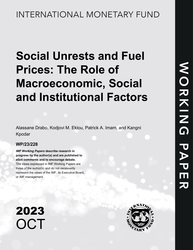
Social Unrests and Fuel Prices: The Role of Macroeconomic, Social and Institutional Factors
Social Unrests and Fuel Prices: The Role of Macroeconomic, Social and Institutional Factors
READ MORE...
Volume/Issue:
Volume 2023
Issue 228
Publication date: October 2023
ISBN: 9798400257384
$20.00
Add to Cart by clicking price of the language and format you'd like to purchase
Available Languages and Formats
| English |
Prices in red indicate formats that are not yet available but are forthcoming.
Topics covered in this book
This title contains information about the following subjects.
Click on a subject if you would like to see other titles with the same subjects.
Inflation , Economics- Macroeconomics , Public Finance , Economics / General , Retail fuel prices , Social unrests , Public spending , Institutions , baseline result , stage regression , transmission of fuel price , changes in fuel price , fuel riot , Gov , effectiveness WGI , Fuel prices , Inflation , Energy subsidies , Oil prices , Global , Middle East , Caribbean , Europe , Africa
Summary
This paper investigates the impact of fuel price increases on social unrests in addition to the macroeconomic, social and institutional factors driving this relationship. Using the IV fixed-effect estimator on a sample of 101 developing countries during 2001-2020, we find that changes in fuel prices are positively associated with the number of social unrests, mainly anti-government demonstrations. This impact is however amplified: (i) during economic downturns and periods of high exchange rate instability; (ii) when government spending is low, especially on health and education, thus suggesting that streamlining fuel subsides and diverting parts of the reform savings to the health and education sectors is an appropriate policy that could appease social tensions; (iii) in countries with high income inequality, low institutional quality and high level of corruption. The results are robust to a battery of tests, including the use of an instrumental variable approach to address reverse causality concerns given that social unrests could also prompt a freeze in fuel prices. We also find consistent results using either changes in diesel or gasoline prices. Overall, the findings of the paper provide support to the grievance and deprivation theory in explaining the association between fuel price increases and social unrests, but fail to find evidence for the resource theory and the theory of political opportunities.
Copyright © 2010 - 2026
Powered by:
AIDC



